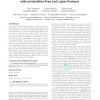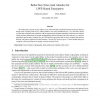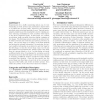91 search results - page 14 / 19 » Immunizing Encryption Schemes from Decryption Errors |
109
click to vote
EUROCRYPT
2009
Springer
16 years 1 months ago
2009
Springer
A group key agreement (GKA) protocol allows a set of users to establish a common secret via open networks. Observing that a major goal of GKAs for most applications is to establish...
102
click to vote
MOBISYS
2008
ACM
16 years 22 days ago
2008
ACM
We present the design and evaluation of an 802.11-like wireless link layer protocol that obfuscates all transmitted bits to increase privacy. This includes explicit identifiers su...
197
click to vote
CTRSA
2011
Springer
14 years 4 months ago
2011
Springer
We analyze the concrete security and key sizes of theoretically sound lattice-based encryption schemes based on the “learning with errors” (LWE) problem. Our main contribution...
105
click to vote
EDBTW
2010
Springer
15 years 8 months ago
2010
Springer
Requirements for a traffic monitoring system can be very demanding as both privacy and performance aspects have to be taken into account jointly. Moreover, the legislation sets fo...
120
click to vote
CRYPTO
2010
Springer
15 years 2 months ago
2010
Springer
Following Gennaro, Gentry, and Parno (Cryptology ePrint Archive 2009/547), we use fully homomorphic encryption to design improved schemes for delegating computation. In such schem...



